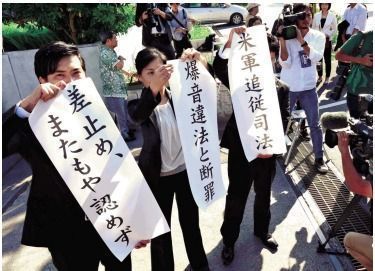In second Futenma noise lawsuit, court rejects demand for flight ban, claims of unconstitutionality

Lawyers representing the plaintiffs hold signs in front of the Okinawa branch of the Naha District Court after the judgement was issued in the second Futenma noise lawsuit on the morning of November 17 in Okinawa City
November 18, 2016 Ryukyu Shimpo
On November 17, the Okinawa branch of the Naha District Court, presided over by Judge Tetsuya Fujikura, issued a judgement in the second Futenma noise lawsuit. The lawsuit saw 3,417 residents living near U.S. Maine Corps Air Station (MCAS) Futenma demand a substantial ban on flights by U.S. military aircraft, which are the source of noise pollution, as well as compensation for both past and future damage resulting from the noise. Judge Fujikura assessed that “the [Japanese] government is not in a position where it is able to regulate or restrict flights by U.S. military aircraft at MCAS Futenma” and rejected the demand for a ban on flights using the same logic that has been used in previous lawsuits relating to noise from the bases, namely that the flights are an “act by a third party” that therefore cannot be controlled. The court rejected the argument that the agreement between the Japanese and U.S. governments for Japan to provide the Futenma base to the U.S. is unconstitutional and invalid on the grounds that the issue is not a matter to be deliberated on by the court. However, the court found that the harm suffered by the plaintiffs exceeds tolerable levels, and ordered the government to pay 2.46 billion yen for past damage. The plaintiffs intend to appeal the judgement.
The court ordered the government to pay 7,000 yen per month to residents experiencing a Weighted Equivalent Continuous Perceived Noise Level (W value) of 75 or more, and 13,000 yen per month to residents experiencing a W value of 80 or more per month. These amounts are each 1,000 yen more than the amounts ordered to be paid to residents experiencing the same W values in the first Futenma noise lawsuit, and are the highest of any amounts ordered to be paid in base-related noise lawsuits in Japan. The demand for compensation for future damages was dismissed.
Judge Fujikura indicated that the noise and low-frequency sound causes disruption of people’s daily lives, psychological distress, and sleep disruption. Although the court did not acknowledge an increase in the risk of ischemic heart disease or an increase in low birthweight rates, it acknowledged claims of health damage resulting from base-related noise in part, finding that there has been an increased risk of adverse health effects resulting from high blood pressure.
Although the court found that low-frequency sound is a cause of disruption of people’s daily lives, psychological distress, and sleep disruption, it said that there is not enough evidence to find that physiological effects and health effects are occurring. The court did not acknowledge any harm as a result of the Osprey aircraft, which were deployed after the lawsuit was filed, saying that there is not enough evidence to find that harm to the plaintiffs has increased.
Meanwhile, the court indicated that although more than four years have passed since the first Futenma noise lawsuit came to a close, there has not been any significant change in measures by the U.S. and Japanese governments to prevent damage, and assessed that the illegal damage being caused to nearby residents has been left undealt with.
The court did not acknowledge the claims of residents living outside the contour (distribution map) for noise pollution around the airfield, saying that damage suffered by such residents cannot be found to be of a degree as great as that suffered by those experiencing a W value of 75 or greater.
(English translation by T&CT and Sandi Aritza)
Previous Article:Nine hundred people gather to demand fair trial from Supreme Court in Henoko lawsuit
Next Article:Vietnam and Okinawa to make TV drama
[Similar Articles]
- In third Kadena noise lawsuit, demand for flight injunction dismissed but 30.2 billion ordered in damages
- Japanese government ordered to pay 754 million yen compensation for Futenma noise pollution
- Japanese court dismisses Kadena noise suit against U.S., citing lack of jurisdiction
- Number of plaintiffs in fourth Kadena noise lawsuit exceeds 30,000
- Residents around Kadena Air Base sue the U.S. government
 Webcam(Kokusai Street)
Webcam(Kokusai Street)


